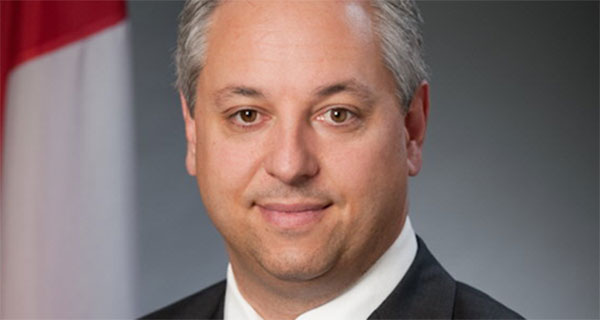 When David Vigneault addressed the Economic Club, the nation’s intelligence chief acknowledged his agency’s first rule: “Don’t talk.” True to form, he said little in his tightly-scripted remarks on Dec. 4.
When David Vigneault addressed the Economic Club, the nation’s intelligence chief acknowledged his agency’s first rule: “Don’t talk.” True to form, he said little in his tightly-scripted remarks on Dec. 4.
What the Canadian Security Intelligence Service (CSIS) director left out, though, amounted to glaring omissions. His remarks were misleading at best, dishonest at worst. The way he couched select words revealed a great deal about CSIS intentions and priorities.
Four facts flip Vigneault’s speech on its head. They reveal it to be a slick deflection and thinly-veiled push for broader surveillance.
Canada has its own economic-espionage program.
“There is state-sponsored espionage in Canada,” he warned. Foreigners “tilt the playing field in their favour and undermine the principles of fair competition … to steal your ideas and use them to get rich.”
He neglected to mention Canada’s participation in the world’s largest spy network. The Five Eyes alliance – with Australia, New Zealand, the United Kingdom and the United States – has for decades circumvented laws abroad.
Journalists caught Canada’s spies red-handed in 2013 monitoring Brazil’s mining and energy ministry and not for national security. Brazilians demanded an explanation for why Canadian and U.S. agencies had targeted the state-run Petrobras oil firm.
Ottawa refused to acknowledge wrongdoing. However, former CSIS officer Michel Juneau-Katsuya told CBC News that Canada conducts economic espionage “basically everywhere [on] everybody that has involvement with our national security. … The concept of economic security is part of national security.”
Government documents show Canada’s energy leaders regularly hold confidential meetings with intelligence agencies “to discuss national security, criminal intelligence, threat risk assessment, and to share energy-related classified intelligence.”
CSIS has rejected accountability and deceived courts.
“We take the social contract we have with Canadians … very seriously,” says Vigneault. “Accountability is at the centre of everything we do. … We welcome it.”
As reported by the Globe and Mail in late 2013, “Canada’s spy agencies have deliberately misled judges to expand their eavesdropping powers unlawfully.” CSIS and the Communications Security Establishment (CSE) deceived courts when requesting a warrant to spy on a suspect overseas.
The intelligence agencies used U.S. and U.K. surveillance dragnets without permission and divulged their own information to foreign agencies. Judge Richard Mosley asserted this was no slip-up but “a deliberate decision to keep the court in the dark … [and] strategically omit information” from warrant applications. CSIS “breached its duty of candour.”
With the recent passage of an Australian law, which mandates backdoors to encryption, the Five Eyes have a work-around for Canadian constitutional protections. Australia is the weakest link, able to snoop and share information with Five Eyes allies.
As Edward Snowden revealed, this has already happened between the United Kingdom and the United States and between Australia and the United States. The Australian attorney general also wants warrants more easily enforceable abroad.
Cryptocurrencies have no relation to terrorism.
“Terrorists also exploit privacy settings, messaging apps, and cryptocurrencies to … evade detection,” claims Vigneault. Yet attempts to raise cryptocurrencies for terrorism have come up empty handed. Cash remains more anonymous and useful.
On Nov. 8, the House of Commons Standing Committee on Finance presented its cryptocurrency report. According to expert testimony, “Public understanding of terrorist financing does not reflect the modern reality. … The five most recent terror attacks in the United Kingdom were perpetrated at a total cost of under £4,000 [CAN$6,800] and did not involve large or international transfers … but rather inexpensive acts such as renting a vehicle to be used as a weapon.”
A 2017 EU report concluded cash remains king for terrorists. Cryptocurrencies require “technical knowledge and technical expertise which has a dissuasive effect on terrorist groups. The reliance on virtual currencies has some cost and is not attractive.”
In May, the European Parliament found that “In their current form and at current levels of adoption, [virtual currencies] may not present terrorist actors with substantial advantages over other methods of funding and financing they already utilize.”
Cryptocurrencies do challenge tax collection, which might explain the federal official’s paranoia.
Canada lacks a corporate-espionage law.
There is no criminal law protecting trade secrets in Canada. Vigneault claims he is “eager to help businesses protect themselves amid a challenging security landscape,” but this lofty talk lacks teeth for enforcement.
While the Security Information Act punishes the sharing of government secrets, the Intellectual Property Office says, “In Canada, there is no formal intellectual property process for protecting a trade secret.”
This deficiency has not gone unnoticed with Canadian companies. When seeking legal recourse against foreigners, there is little Canadian firms can do, according to Barry Sookman, an intellectual-property lawyer in Toronto: “China and Russia are huge culprits. But it is very hard to prove. It is also a very expensive process.”
Juneau-Katsuya, who also served in the RCMP, explains: “When bad things happen to good companies, the Mounties or CSIS might be of little help.” He eventually started his own consultancy, “basically a private CSIS,” to serve Canadians and bridge the gap.
Fergus Hodgson is the executive editor of Antigua Report, a columnist with the Epoch Times and a research associate with Frontier Centre for Public Policy. Daniel Duarte contributed to this article.
The views, opinions and positions expressed by columnists and contributors are the author’s alone. They do not inherently or expressly reflect the views, opinions and/or positions of our publication.


